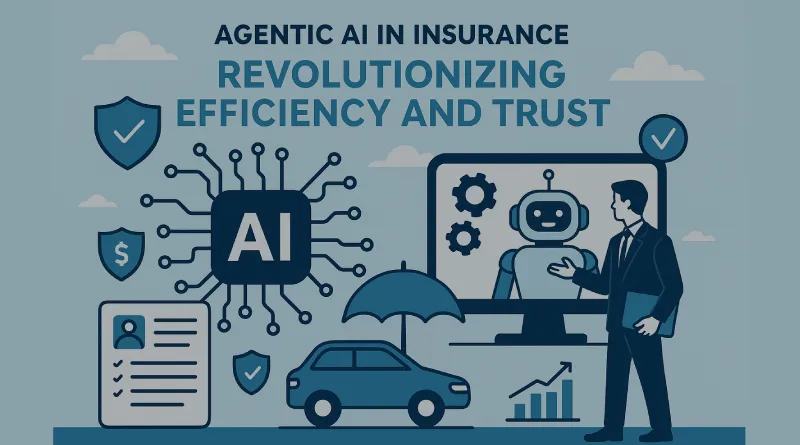Agentic AI in Insurance: Revolutionizing Efficiency and Trust
The insurance sector that has always struggled due to manual procedures and complicated business models is experiencing a paradigm shift with the introduction of agentic AI. It contrasts with traditional AI which adheres to strict rules, instead, agentic AI makes its decisions autonomously: relying on up-to-date information and situational analysis. Agentic AI is changing the future of operational resiliency and customer trust, whether through automating claims, optimizing fraud detection, personalizing customer experiences and more. Focusing on one industry, this article will dive into the advantages and applications of agentic AI in the insurance sector, as well as the niche adaptation strategies, to provide useful and applicable value both to the insurers and customers.
What is Agentic AI?
Agentic AI is the intelligence of systems that can make their own decisions in order to attain a certain objective without continuously being monitored by a human being. According to Salesforce, in insurance, these AI agents perform such work as triaging claims, flagging frauds, and changes to policies based on reading the data, recognizing patterns, and making previously set up moves. In contrast to the conventional rule-driven automation, the agentic AI works dynamically and learns through the results to improve itself over a period. According to McKinsey & Company, the processing time of a claim may be reduced up to 70 times, and the handling cost decreased up to 30 times, thanks to the use of AI, as it can transform the sector.
Key Use Cases of Agentic AI in Insurance
Agentic AI addresses critical pain points across insurance operations, delivering measurable outcomes. Here are four high-impact applications:
- 1. Automated Claims Processing: Agentic AI shoves the claims life to accelerate document validation, damage evaluation through image recognition, and allow low-risk claims to be approved immediately. Softweb Solutions observes that this minimizes processing time that could have taken weeks to a few hours and ensures that customer satisfaction increases. The HDFC ERGO in India reduced the motor insurance claim settlement process to 2 hours (previously it was 15 days) as a result of which the customer satisfaction grew by 40%.
- 2. Fraud Detection: According to WNS DecisionPoint, fraudulent claims cheat the insurers of $34 billion yearly. To safeguard against suspicious patterns, agentic AI targets transactions in real-time, applying behavioral analytics and anomaly detection to mark highly suspicious patterns. It maximizes compliance and trust by having blockchain to validate the transaction to reduce false positives.
- 3. Dynamic Underwriting: Conventional underwriting will be done using the static information, and this has a big tendency to cause mispriced policies. To form individual risk profiles, agentic AI examines data streams in real-time, including credit scores and IoT device data and market trends. The McKinsey analysis has estimated the increase in efficiency between 30-50 percent when all underwriting becomes real time and able to attract high quality customers through customization of offers.
- 4. Individual Customer Relationship: Accenture data reveal that less than 29 percent of insurance consumers are satisfied with their insurers. Agential AI uses customer data to provide hyper-personal applications of policies and active communication in the form of chatbots. As an example, the RIA system of ICICI Lombard is adjustable with the past history of the customer, and hence enhances retention and the possibility of cross-selling.

Benefits of Agentic AI
Agentic AI delivers tangible advantages, reshaping insurance operations and customer relationships:
- Efficiency in Operations: repeatable processes that require a lot of manual interventions such as document verification and compliance checks can be automated to minimize the number of manual touchpoints thus saving on general and administrative costs by up to 20 % within property and casualty insurance, according to McKinsey.
- Increased Fraud Detection: The ability to monitor fraud in real-time and make predictions reduces financial losses, building trust into the brand.
- Customer-Centric Experiences: A specific, individualized policies and quicker resolutions enhance collaboration and McKinsey has observed a 10-15 percent revenue uplift after personalization.
- Scalability: One thing about agentic AI is that when insurers scale, the extra cost does not scale with it.
Unique Insights: Balancing Innovation and Ethics
Although the advantages of agentic AI are obvious, its use poses some new issues. The independence of AI agents requires strong management to remain open and just. As GrowthJockey points out, non-transparent decision logic becomes a compliance issue, with explainable models and auditable history, such as the impact of regulations such as GDPR and India IRDAI, in line. Also, too much AI may drive the customers who desire a human relation, especially in complicated claims. Insurance companies need to have a human-in-the-loop process, and there should be well-known escalation methods in the case of edge cases to ensure trust.
In local terms, India has only a low penetration rate of insurance of 4.2% (IRDAI, 2025), and thus an immense future prospect to the agentic AI. With 700 million internet providers (Statista, 2025), the digital potential of the country aids real-time data gathering through mobile apps and IoT gadgets. Nevertheless, cultural preferences of involvement in particular matter and linguistic diversity across regions demand AI systems to be multilinguistic and localized. Even Indian insurance firms such as HDFC ERGO and ICICI Lombard have shown how agentic AI can fill these gaps, yet the spread of adoption depends on how to take care of the data privacy issue based on the Digital Personal Data Protection Act (DPDP).
Adoption Strategy for Insurers
Implementing agentic AI requires a structured approach to maximize impact and minimize risks:
- 1. Compute the Readiness: monitor the IT infrastructure, quality of data, and the competence of the labor force. Haolag- identify the restored systems in a way that they can interact with AI, as previously advised by Softweb solutions, by creating APIs integration.
- 2. Get Pilots: Experiment with high-impact, and pilot low-risk uses like fraud detection or claims processing. Measuring KPIs such as the decrease in the time of processing and the accuracy level.
- 3. Found a Data Base: Scrub and organize data with disintegrated systems to drive the right AI models, according to the recommendations of Gartner.
- 4. Talk to Experts: Discuss the solutions with AI companies and make it constitutional to cross the IRDAI and GDPR regulations.
- 5. Manage Change: Train the workforce about the usage of AI and utilize advantages to appeal to customers and learn how to operate with AI.
- 6. Scale and Optimize: By methodically scaling up into underwriting and customer service, feedback loops can be used to optimize the work of AI to draw robust insights.
Future Trends
Agentic AI’s future in insurance will be shaped by:
- IoT Synergies: Integration with wearables and telematics for real-time risk monitoring.
- Advanced Predictive Analytics: Continuous learning from behavioral data to anticipate claims and customer needs.
- Ethical AI Governance: Transparent frameworks to ensure compliance and minimize bias, aligning with global standards.
Conclusion: A New Era for Insurance
The revolution is not merely a refinement of the insurance business, but agentic AI. It enables the insurers to keep in stride with the rising customer expectations due to automation of routine operations, optimization of fraud detection and personalization enabling the insurers, to create profitability. As the penetration of digital platforms is growing fast in India, agentic AI offers the way out of increasing access to insurance, but the scaling is available through the balance of innovation and ethical oversight. The concept of efficiency, trust, and growth will see transformational changes in this new era of digitization where the insurers that implement agentic AI will raise the levels of competition.
Disclaimer
The information presented in this blog is derived from publicly available sources for general use, including any cited references. While we strive to mention credible sources whenever possible, Web Techneeq – Seo Company in Andheri does not guarantee the accuracy of the information provided in any way. This article is intended solely for general informational purposes. It should be understood that it does not constitute legal advice and does not aim to serve as such. If any individual(s) make decisions based on the information in this article without verifying the facts, we explicitly reject any liability that may arise as a result. We recommend that readers seek separate guidance regarding any specific information provided here.

